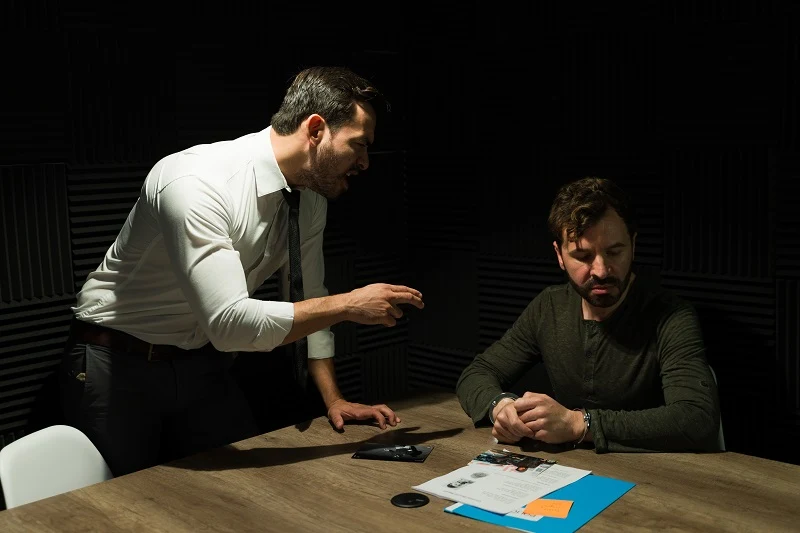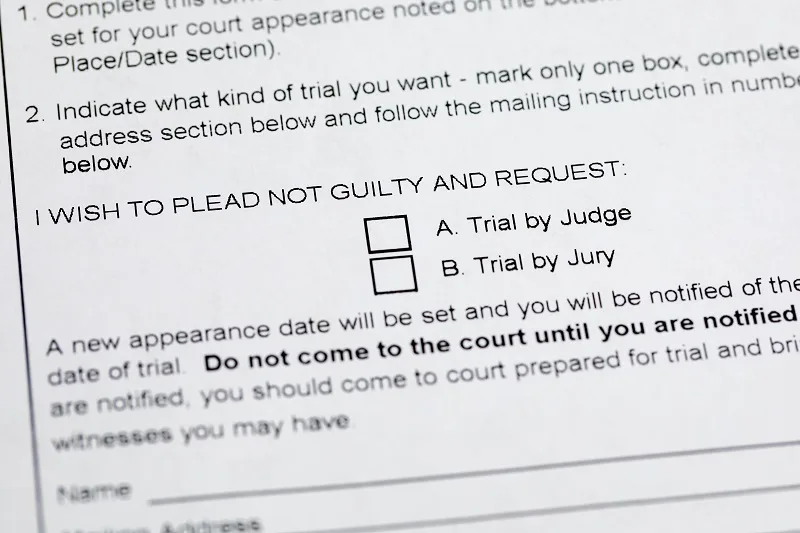
Should I Take the Plea Bargain?
If you're facing criminal charges, there's a good chance the prosecutor will offer you a plea bargain. On the surface, it might sound like a lifeline: take the deal, skip the risk of going to trial, and move on. But before you sign anything or say the words “I plead guilty”, you need to understand one thing clearly:
Plea bargains aren’t always in your best interest. In fact, in many cases, they do more harm than good.
The criminal justice system relies on plea negotiations to keep things moving. But that convenience often comes at the cost of your future, your freedom, and your rights. Let’s break it all down so you can make an informed decision with your Texas Board-Certified criminal defense lawyer, not a rushed one in a courtroom hallway.
The Real Cost of a Plea Bargain

A plea deal might get you out of the courtroom faster, but it doesn’t erase the impact of a guilty plea. Here’s what you’re really giving up:
- You admit guilt, even if you didn’t do it.
- You now have a criminal record.
- You give up your right to a jury trial.
- You lose the chance to challenge witness credibility, evidence, or police misconduct.
- You might face immigration issues, housing denial, or employment roadblocks.
- You waive most appeal options, and once it’s done, it’s done.
Pleading guilty doesn’t end the problem — it can start new ones.
If you accept a plea and plead guilty, you may lose the chance to ever have the charge expunged or sealed. Expunctions in Texas are only available under very specific conditions, and a guilty plea usually takes that option off the table. That means your record could follow you for life, even if the offense was minor or you turned your life around.
Why Plea Bargains Are Pushed So Hard

Prosecutors and courts want cases closed fast. Trials take time and money. So the system pressures defendants — especially scared, overwhelmed, first-time offenders — into accepting deals they don’t fully understand.
You’ll hear things like:
- “Take the deal before it disappears”
- “You’ll get a harsher sentence at trial”
- “This is your only shot”
But here’s the truth: those threats are often just tactics to move the case along. And without strong legal representation, many defendants take deals that aren’t in their best interest, all because they feel trapped.
Critics argue that plea bargaining undermines the entire concept of justice. And they’re right, as many plea deals are made under pressure, not by free choice.
Some people plead guilty to crimes they didn’t commit to avoid risking a severe sentence at trial. This lets innocent people be convicted without ever seeing a jury. It allows the real criminal to roam free and clear. And that’s not justice.
What You Lose When You Plead Guilty

Accepting a plea bargain means giving up your constitutional right to a fair trial, including the right to:
- See the evidence against you
- Cross-examine witnesses
- Challenge the prosecution's case
- Require proof beyond a reasonable doubt
You also take on a criminal conviction, which can:
- Limit your future employment opportunities
- Disqualify you from professional licenses
- Lead to child custody complications
- Jeopardize your immigration status
- Strip away voting privileges or gun rights
And for what? A more lenient sentence? That “deal” might still involve jail time, fines, or probation, and it follows you for life.
Why You Should Fight for Your Rights Instead

If you didn’t commit the crime or the evidence against you is weak, why plead guilty?
- The prosecution has to prove its case.
- You have the right to make them do it in open court.
- You may win at trial, or get charges dropped along the way.
- You keep your record clean if you're found not guilty.
And even if the evidence feels stacked against you, an experienced criminal defense lawyer can expose weaknesses in the case, challenge unlawful police behavior, or negotiate a better outcome without admitting guilt.
If you’re worried about going to trial, your attorney will also help you prepare for the courtroom — from understanding how testimony works, to reviewing potential questions, helping you stay calm and confident. Trials are winnable, and preparation is key.
Are There Ever Times You Should Accept a Plea Bargain?
Yes, but only after careful review by a criminal defense attorney, preferably one who is Texas Board-Certified and specializes in this area of the law.
There are some situations where accepting a plea might make sense, such as:
- The evidence is overwhelming, and a fair trial is unlikely.
- The deal includes a dismissal of more serious charges.
- The sentence avoids jail, keeps you working, and limits long-term consequences.
- You’re facing mandatory minimum sentences with no flexibility if convicted at trial.
Even then, it should never be a rushed decision. You have the right to know exactly what you’re giving up — and why.
Should I Ever Accept the Plea If I'm Innocent?
Not until you talk with a criminal defense attorney. Many innocent people are pressured into accepting a plea bargain out of fear, confusion, or to avoid a potentially harsher sentence at trial. This is especially dangerous in emotionally charged cases like sexual assault, where the consequences of a guilty plea can include sex offender registration, loss of parental rights, restrictions on where you can live, and a criminal conviction that never goes away — all while being completely innocent.
If you're considering a plea while knowing you're innocent, stop. Consult an experienced defense lawyer first. There may be flaws in the prosecution's case you haven’t seen, but your attorney can. Innocence deserves to be defended, not bargained away.
How to Know If a Plea Bargain Is Fair

Before making a decision, ask:
- Has the evidence been reviewed thoroughly?
- Have all defenses been explored?
- Is the plea truly better than the possible trial outcome?
- Are there immigration, custody, or employment impacts?
- Is the prosecution offering this deal because their case is weak?
And most importantly: Do I feel informed and in control, or rushed and confused?
Don’t Let the System Silence You. We Will Fight for You!
As a former prosecutor turned criminal defense attorney, Ryan H. Deck knows exactly how plea deals are built and how they pressure defendants into giving up their rights. He’s handled hundreds of criminal cases in Williamson County and understands how to expose weak charges, challenge bad evidence, and fight for a favorable outcome without forcing you to take the fall.
Don’t plead guilty just because you’re scared or confused. Let us review your case, explain your options, and help you protect what matters most: your freedom, your record, and your future.
FAQs


Texas Board-Certified Criminal Defense Attorney with over 20 years of experience

Target

Stand Up for Your Rights — Don’t Settle for a Quick Deal
You deserve better than a rushed guilty plea. Let us fight for your name, your record, and your future starting today.
Who benefits the most from a plea bargain?
Prosecutors and the court system benefit the most from a plea bargain. It helps them avoid the time, cost, and uncertainty of a trial while still securing a conviction. For the defendant, the benefits are more questionable. While a plea agreement might offer a reduced sentence or fewer charges, it has long-term consequences, including a criminal record, limited appeal rights, and possible impact on future employment opportunities, housing, and more. That's why many criminal defense lawyers urge clients to look beyond the short-term “deal” and weigh what they’re really giving up.
Do you go to jail immediately after a plea deal?
Not always, but it depends on the terms of the plea agreement and the outcome of the sentencing hearing. In some cases, the defendant pleads guilty and begins serving jail time immediately. In others, especially with probation or deferred adjudication, the sentence might be suspended, delayed, or served under supervision.
What happens if police don't have enough evidence?
If police don’t have enough evidence, the prosecution’s case becomes weak, and that’s where your defense has power. In a criminal case, the burden is on the state to prove your guilt beyond a reasonable doubt. If the evidence is thin, don’t settle. A strong defense may be all you need to protect your record, your rights, and your future.
This is some text inside of a div block.
Lorem ipsum dolor sit amet, consectetur adipiscing elit. Suspendisse varius enim in eros elementum tristique. Duis cursus, mi quis viverra ornare, eros dolor interdum nulla, ut commodo diam libero vitae erat. Aenean faucibus nibh et justo cursus id rutrum lorem imperdiet. Nunc ut sem vitae risus tristique posuere.


